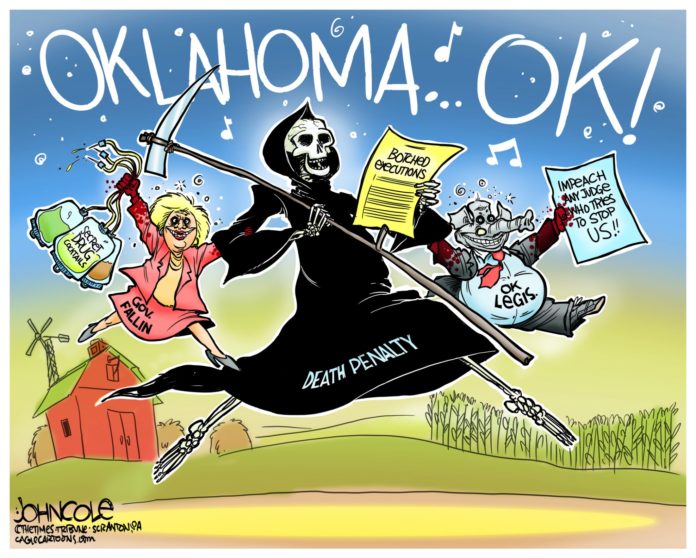UPDATED: 8.26.14
The Oklahoma Observer, the Guardian US and the American Civil Liberties Union today filed suit in federal court, seeking to prevent Oklahoma prison officials from arbitrarily filtering what journalists can witness during executions.
The lawsuit follows April’s botched execution of Clayton Lockett at the state penitentiary in McAlester. When the procedure did not go as planned, prison officials closed the curtain in the death chamber, blocking the view of independent witnesses.
“Oklahoma taxpayers have an absolute right to know what their government is doing in their name – especially when it comes to imposing the court’s ultimate punishment,” said Observer Editor Arnold Hamilton, a plaintiff in the case.
Lockett died 43 minutes later – allegedly of a heart attack – but the circumstances surrounding his death remain a mystery. There were no independent witnesses, and the precise cause of death has yet to be determined.
The lawsuit demands that reporters and other witnesses be permitted to view the execution, without interruption, from the time the condemned prisoner enters the execution chamber until he or she leaves it.
“The state of Oklahoma violated the First Amendment, which guarantees the right of the press to witness executions so the public can be informed about the government’s actions and hold it accountable,” said ACLU Staff Attorney Lee Rowland.
“The death penalty represents the most powerful exercise of government authority. The need for public oversight is as critical at the execution stage as it is during trial.”
At the Lockett execution, as with other executions in Oklahoma, the windows for witnesses to look into the execution chamber were covered while Lockett was brought into the chamber, strapped down, and had intravenous lines inserted. The curtain was raised only when officials began to administer the lethal drugs.
After about 20 additional minutes, state officials closed the curtain after Lockett began to writhe, groan, and speak when he should have been unconscious.
The curtain stayed down for approximately 20 more minutes, during which prison officials said they tried to determine the problem, called off the execution, and finally declared Lockett dead of a heart attack.
The suit seeks to require the state to open the curtain as soon as a condemned inmate is wheeled into the death chamber – and before it inserts IVs that would carry the lethal cocktail.
It also would mandate the state keep the curtain open until the condemned is declared dead – or until the execution is called off and state officials seek to resuscitate the inmate.
In the Lockett case, state officials claimed the execution team had trouble finding a suitable vein – possibly because of dehydration – forcing insertion of an IV into Lockett’s femoral vein. They also claimed Lockett’s vein had blown or ruptured – the death drugs seeping not into his bloodstream but into surrounding tissue.
Lockett’s attorneys, however, hired a medical examiner to conduct a separate autopsy. Dr. Joseph Cohen said he found no evidence of dehydration or other problems with Lockett’s veins – nor did he find any evidence that Lockett’s vein blew. Rather, he said, the needle punctured Lockett’s vein.
Journalist Katie Fretland, another plaintiff in the lawsuit, represented The Observer the death chamber and wrote about what she saw for both The Observer and the Guardian.
“At an execution, the press serves as the public’s eyes and ears,” she said. “The government shouldn’t be allowed to effectively blindfold us when things go wrong. The public has a right to the whole story, not a version edited by government officials.”
“Regardless of where Oklahomans stand on the death penalty, the idea that the government has the right to exercise its ultimate power in secret is one that we can all reject,” said Ryan Kiesel, executive director of the ACLU of Oklahoma.
Lockett, 38, was condemned to die for the 1999 murder of Stephanie Nieman, a Perry, OK teenager who was shot then buried alive.
As Observer contributor Richard L. Fricker noted in an essay posted on-line May 15, “Lockett committed a particularly heinous crime. Even the most ardent death penalty opponent would be pressed to find sympathy for Lockett. His crime and trial are not at issue. It is the manner – ‘protocol,’ in execution terms – the state used which is at issue.”
The lawsuit was filed in the western district of Oklahoma. The complaint can be read at https://www.aclu.org/free-speech/oklahoma-observer-v-patton-complaint
UPDATED 8.26.14
The Society of Professional Journalists’ Oklahoma Pro Chapter issued the following statement about the lawsuit:
The Oklahoma Pro Chapter of the Society of Professional Journalists expresses its full support for a federal lawsuit challenging the state of Oklahoma’s curtailment of First Amendment rights during the execution of Clayton Lockett.
Chapter President Jaclyn Cosgrove commended the American Civil Liberties Union for filing the lawsuit on behalf of the Oklahoma Observer, the Guardian US and reporter Katie Fretland, who covered the April 29 execution for the two news organizations.
The suit was filed [Aug. 25] in U.S. District Court in Oklahoma City. It challenges the state’s decision to draw the blinds and prevent the press and other witnesses from observing what took place after Lockett’s execution went awry. Lockett was declared dead more than 20 minutes after the execution was officially halted.
The lawsuit asserts that the state’s actions violated the plaintiffs’ First Amendment right to view executions without interruption. It asks the court to change its official protocols to protect ensure the press can view future executions without interruptions.
“The state’s execution process is already out of public view,” Cosgrove said. “To block the view of an execution to the media, who are there to represent the public’s interest, is not only a disservice, but also an overextension of authority on the state’s part.”







